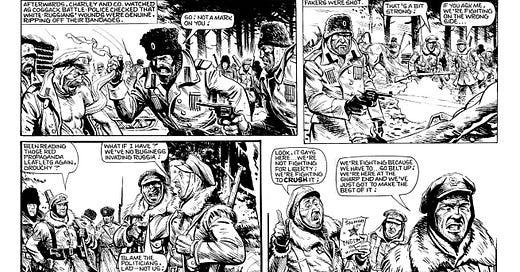Secret History: Charley's War - The Russian Front
If it hadn’t been for Charley’s War, I doubt many people today would even be aware of this unwarranted invasion of a sovereign nation.
Welcome to my Secret History of Comics: my new book serialised on Substack. The first section was on Marshal Law: now it’s all about Charley’s War.
If you’re joining me for the first time, you can read the intro to the Secret History here, it’s available for everyone, and so is the intro to Charley’s War.
Every subsequent post has a free preview, but if you want access to my entire rant post, you’ll need to subscribe. Full access to ALL of my Secret History of Comics as I release them every week (plus other perks, check them out), will set you back just £5 per month or £50 per year, and it helps me to continue giving you my best writing. I even have a free seven-day trial on Iconoblast, so you can try it first.
It’s January 1919 and 13,000 British troops have been sent to North Russia to fight on behalf of the Czarist White Russians. Charley Bourne, ‘volunteered’ by Captain Snell, is one of them. If it hadn’t been for Charley’s War, I doubt many people today would even be aware of this unwarranted invasion of a sovereign nation, although I’m sure it’s well-remembered in Russia. And it can’t be excused or shrugged off as an insignificant campaign. The numbers involved were significantly more than the modern British troops sent to Afghanistan. I had sufficient material to dramatise events, but in recent years I’ve discovered so much more about this campaign and none of it is good, as I shall relate below.
Britain’s relationship with Russia and its commercial and strategic objectives was obscured by propaganda. British secret service agent Sidney Reilly had been part of the Lockhart plot to overthrow the communist regime. It failed and the North Russian campaign was part of the same strategy to destroy the Soviet system. British troops were also fighting in South Russia and Siberia. By having Charley rarely question orders, it meant I could get away with exposing far more of our country’s crimes than if I made him a trouble-making ‘leftie’ like his comrade Grouchy Spencer. I’m certain there would have been editorial pushback, just as there was on my featuring Klu Klux Klan soldiers in 1918 (‘We don’t want to upset anyone.’) So we see the Brits evacuating a town and burning people’s homes to the ground, actions which are dismissed by Charley as ‘It’s war’.
I knew Britain’s role in Russia was far, far worse, but information was limited. If I was writing the story today, I would have access to the vivid account of a visit to Russia by John S. Clarke, whom Wikipedia describes as a British author, newspaper editor, poet, socialist politician, and a young lion tamer. He was also a resistance fighter, opposed to the war with Germany, a sailor, a gun-runner … a most colourful and amusing character, and one of the great untold heroes of the conflict. Untold because his face doesn’t fit in the jingoistic and faux patriotic world in which we now live. He was also an MP for Glasgow who put snakes in the pockets of his fellow MPs!
John S. Clarke, festooned with snakes, said, 'Touch one,
look closely, they're quite beautiful; not slimy;
come on, come down to the front now, that's better.
Don't be afraid, girls, aren't these eyes pure jewels?
Come on lads, stretch your hands out, try this johnny,
I bet it's like no creature you ever handled.'
— extract from Winter, by Edwin Morgan
During the centenary years I tried to interest BBC Scotland radio reporters, who were interviewing me, in doing a piece on this larger-than-life figure who easily puts George Galloway in the shade. I could see their eyes light up, but I could also see they knew they’d never get it past their editor. That’s how censorship worked in the centenary years.
Clarke’s account is an eye opener: Pen Pictures of Russia under the "Red Terror": Reminiscences of a Surreptitious Journey to Russia to Attend the Second Congress of the Third International. Glasgow: National Workers' Committees, 1921.
Not only did he meet Lenin and heal his dog, but he also saw at first hand the atrocities of the British army.
Keep reading with a 7-day free trial
Subscribe to Iconoblast to keep reading this post and get 7 days of free access to the full post archives.




